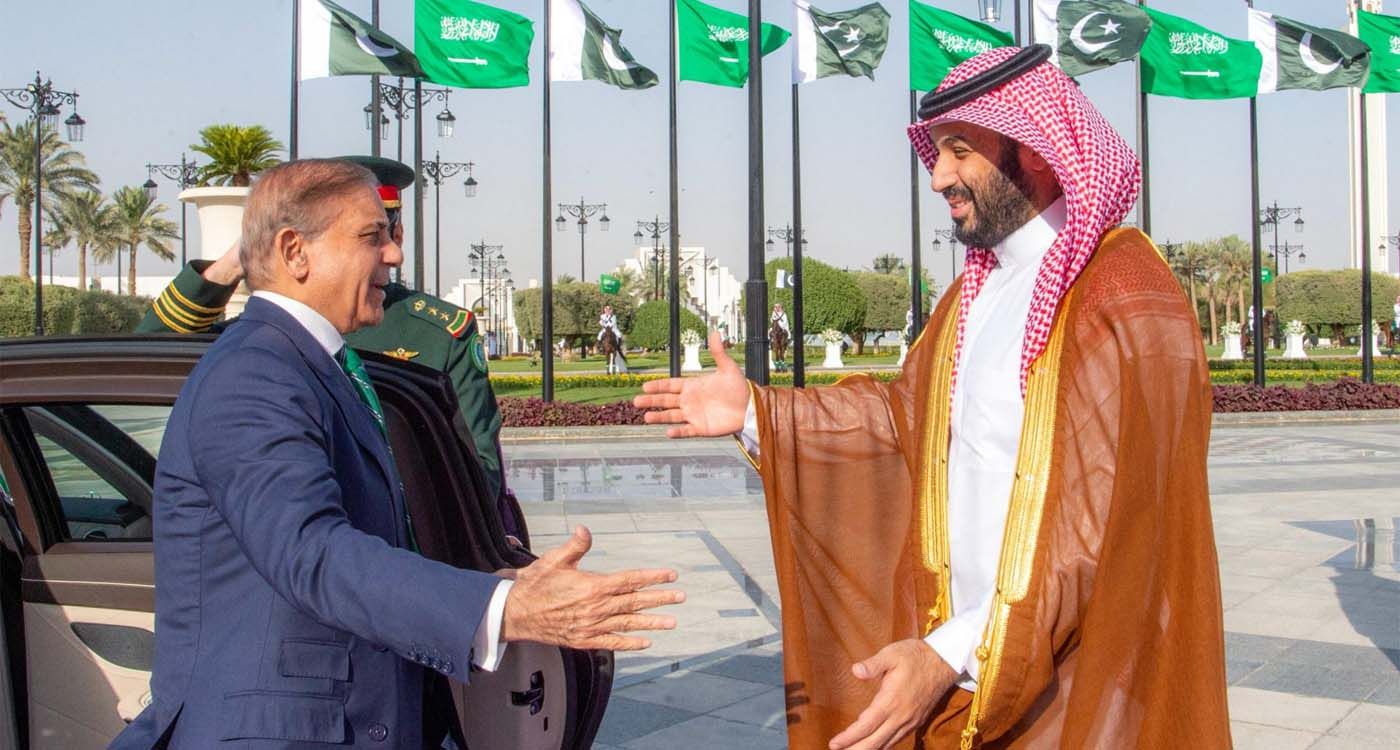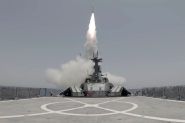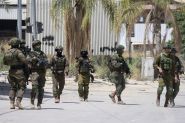- Home
- Middle East
- Saudi-Pakistan Defense Pact Reshapes Regional Power Dynamics

Pakistani Prime Minister Shehbaz Sharif with Saudi Crown Prince Mohammed bin Salman in Riyadh, where the defense pact was signed. ©SPA / AFP
Saudi Arabia and Pakistan signed a Strategic Mutual Defense Agreement on Wednesday, making any act of aggression against one country an act of aggression against both. The accord was formalized during Pakistani Prime Minister Shehbaz Sharif’s state visit to Riyadh, where he met Crown Prince Mohammed bin Salman. Officials described the deal as a significant step in a decades-long security partnership.
“This agreement is a culmination of years of discussions. This is not a response to specific countries or specific events but an institutionalization of longstanding and deep cooperation between our two countries,” a senior Saudi official told the Reuters news agency.
The signing comes amid heightened anxiety in the Middle East. It follows an Israeli airstrike in Doha that killed Hamas leaders, one of several recent events underscoring Gulf capitals’ vulnerability to regional instability. Analysts note that Saudi Arabia, long reliant on the United States as its primary security guarantor, has increasingly looked to diversify its defense partnerships.
According to a joint statement published by the Saudi Press Agency, the agreement reflects the shared commitment of both nations to deepen their security ties and strengthen deterrence “against any aggression.” Publicly, neither government has released the full treaty text, leaving ambiguous key details such as how the pact would be triggered, who would command joint responses, or whether Pakistan’s nuclear arsenal is implicitly included in the guarantee.
What About Pakistan’s Nuclear Weapons?
By turning to Pakistan, the only Muslim-majority country with nuclear weapons and a history of military cooperation with the kingdom, Riyadh appears to be signaling both to allies and rivals that it is prepared to broaden its strategic options.
Regarding the inclusion of Pakistan’s nuclear weapons in the agreement, the same official who spoke to Reuters on condition of anonymity stated, “This is a comprehensive defensive agreement that encompasses all military means.”
Hussain Haqqani, a former diplomat, noted on X that the term “strategic” in the Saudi-Pakistan pact implies coverage of nuclear and missile defense. He added that Pakistan has always referred to its nuclear and missile programs as “strategic assets” and suggested that the agreement could allow Pakistan to purchase US weapons with Saudi funding, similar to arrangements in the 1970s.
Michael Kugelman, a South Asia analyst, commented that while the pact is unlikely to deter India from military action, the alignment with three key powers, China, Turkey and Saudi Arabia, places Pakistan in a stronger strategic position.
Decades in the Making
For Saudi Arabia, the deal consolidates a relationship that already includes extensive training and advisory exchanges. Since the late 1960s, more than 8,000 Saudi military personnel have trained in Pakistan, and joint exercises have become a fixture of bilateral cooperation.
Meanwhile, Pakistan gains a public reaffirmation of support from one of its most important financial backers at a time of ongoing domestic and regional pressures. More than 2.5 million Pakistani nationals live and work in Saudi Arabia, and the kingdom has often stepped in with economic support when Islamabad’s economy faltered.
International Reactions
The pact has already drawn international attention. India, which fought a brief but deadly conflict with Pakistan earlier this year, said it was aware the agreement had been under discussion and would carefully assess its implications. A senior Saudi official sought to reassure New Delhi, describing Saudi-Indian relations as “more robust than they have ever been.”
Iran, which only recently restored diplomatic ties with Saudi Arabia in a Chinese-brokered détente, has yet to issue a detailed response. The United States, for its part, has not formally commented, though analysts suggest the deal reflects Riyadh’s frustration with what it sees as Washington’s wavering commitment to Gulf security.
While the signing ceremony projected unity, the absence of clear details leaves important questions unresolved. Whether the agreement is intended to extend a Pakistani nuclear umbrella over Saudi Arabia, as some analysts have speculated, remains unclear. Nor is it evident how quickly the two militaries could coordinate in the event of an attack, or what types of aggression would fall within the pact’s scope.
Still, the symbolism of the move is unmistakable: it transforms a long-standing but informal security understanding into a binding public commitment at a time when both countries face new pressures from shifting regional dynamics.
Read more




Comments